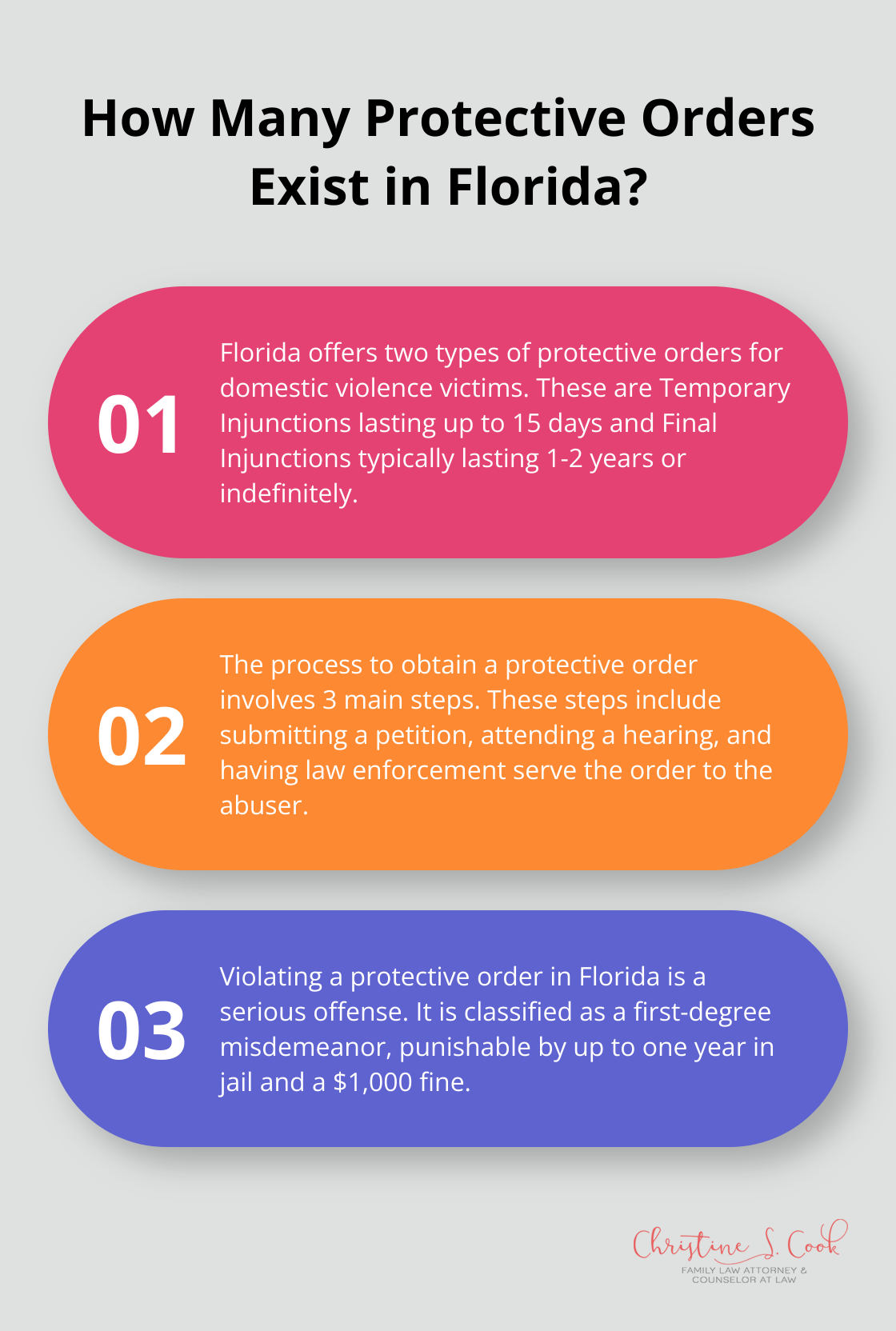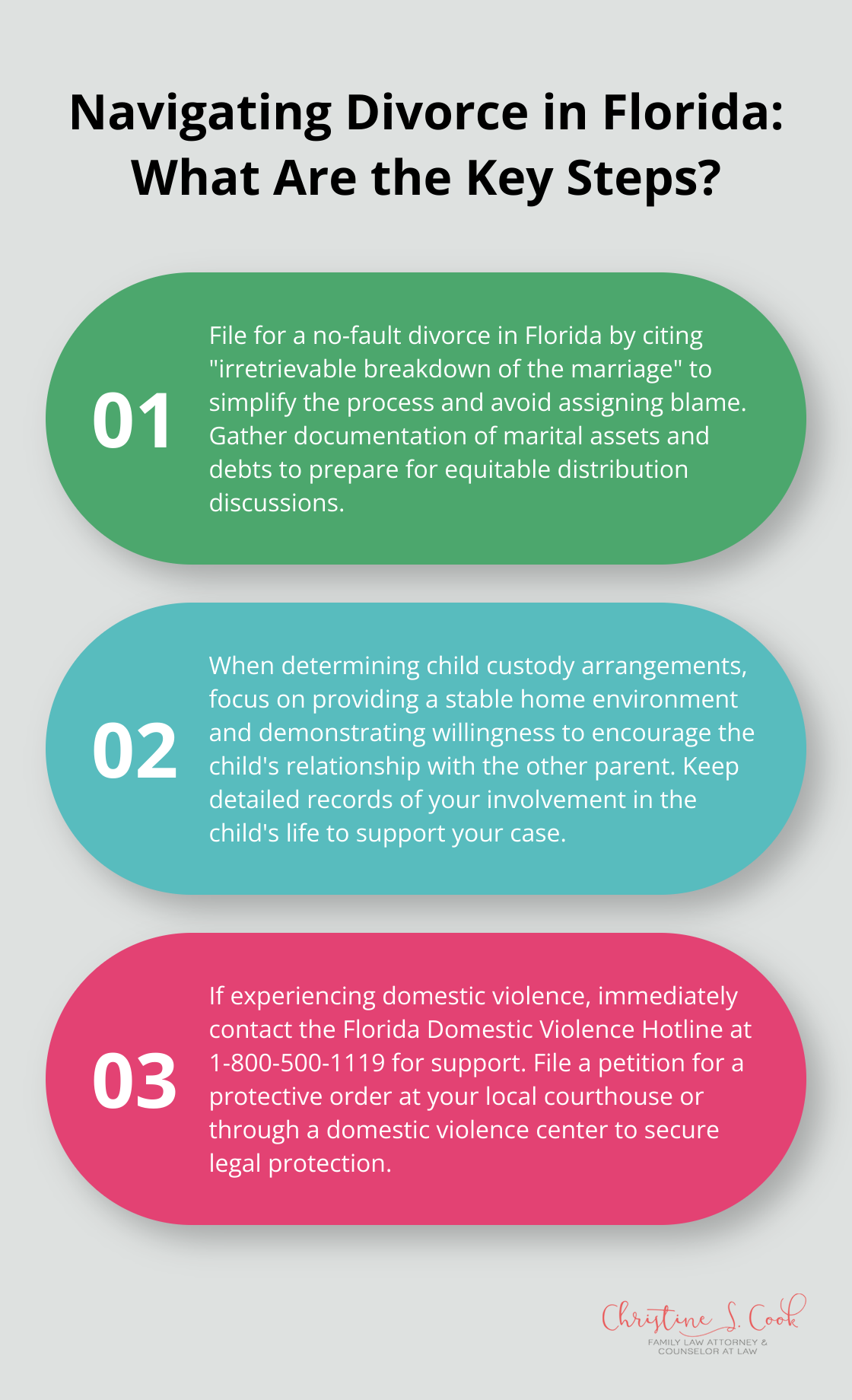Family law issues can be complex and emotionally challenging. At Christine Sue Cook, LLC, we understand the difficulties you may face when dealing with these matters.
This guide will walk you through some of the most common family law issues, providing essential information to help you navigate these situations.
From divorce and child custody to domestic violence protection, we’ll cover key aspects you need to know.
Florida simplifies the divorce process by recognizing “irretrievable breakdown of the marriage” as sufficient grounds for divorce. This no-fault approach eliminates the need to prove wrongdoing, allowing couples to end their marriage without assigning blame.
Florida courts follow an “equitable distribution” model when dividing marital assets and debts. This approach doesn’t guarantee a 50-50 split but considers various factors to ensure fairness. The court may provide for equitable distribution of the marital assets and liabilities without regard to alimony for either party.
Alimony isn’t automatic in Florida divorces. Courts weigh multiple factors when determining spousal support, such as:
Marriage duration
Standard of living during the marriage
Each spouse’s earning capacity
Florida recognizes several types of alimony:
Each type serves a specific purpose and is awarded based on the case’s unique circumstances.
Couples seeking to avoid courtroom battles often opt for collaborative divorce in Florida. This process involves:
Both spouses retaining separate attorneys trained in collaborative law
These attorneys guiding their clients through the process
Financial experts providing guidance
Mental health professionals addressing emotional aspects

Collaborative divorce can lead to more satisfying outcomes and improved post-divorce relationships (especially beneficial when children are involved).
As we move from the complexities of divorce to the equally important matter of child custody and support, it’s essential to understand how Florida law approaches these sensitive issues. The well-being of children remains a top priority in family law proceedings, and the next section will explore the various factors courts consider when making these critical decisions.
Florida law recognizes two main types of custody: physical custody and legal custody. Physical custody determines where the child lives, while legal custody involves the right to make important decisions about the child’s upbringing, education, and healthcare.

Florida courts often prefer to award shared parental responsibility, which gives both parents equal say in major decisions affecting the child. This approach encourages both parents to maintain active involvement in their child’s life.
Florida courts consider numerous factors when determining custody arrangements:
Florida calculates child support using the Income Shares Model. This method takes into account the income of both parents, certain expenses such as taxes and health insurance, and other factors.
The Florida Department of Revenue provides a child support calculator that can estimate potential payments. However, this calculator doesn’t account for all factors that might influence a court’s decision.
Life changes can necessitate adjustments to custody arrangements over time. Florida law allows for modifications to custody and support orders if a substantial change in circumstances has occurred since the original order’s issuance.
Either parent can file their own petition in circuit court to change (modify) a support order. You can hire a lawyer of your choosing or file your own petition.
Examples of substantial changes include:
Parents must follow proper legal procedures when seeking modifications. Informal agreements between parents are not legally binding and can lead to complications in the future.
As we transition from the complexities of child custody and support, it’s important to address another critical aspect of family law: domestic violence and protective orders. These issues can significantly impact custody decisions and require immediate attention to ensure the safety and well-being of all family members involved.
Domestic abuse manifests in various forms, including physical, emotional, and financial control. Common indicators include:
Physical harm or threats of violence
Constant criticism or humiliation
Control over financial resources
Isolation from friends and family
Surveillance of movements or communications

If you identify these behaviors in your relationship, seek help immediately. The Florida Domestic Violence Hotline (1-800-500-1119) offers support and resources.
Florida law provides several protective orders to safeguard domestic violence victims:
These orders can require the abuser to maintain distance from your home, workplace, or school, and may include provisions for temporary child custody and support.
To secure a protective order in Florida:
The process is designed for accessibility, and you don’t need a lawyer to file. However, legal representation can prove beneficial, especially in cases involving complex issues like child custody.
Violation of a protective order in Florida constitutes a first-degree misdemeanor, punishable by up to one year in jail and a $1,000 fine. Repeat violations can escalate to felony charges with more severe penalties.
Law enforcement treats these violations seriously, often resulting in immediate arrest. If you possess a protective order and the abuser violates it, contact the police without delay.
At Christine S. Cook, LLC, we understand the sensitive nature of domestic violence cases. We offer confidential consultations to discuss your options and can guide you through the protective order process. Our priority is to ensure your safety and protect your rights during this challenging time.
Family law issues can overwhelm individuals who face them. Understanding your rights and options proves essential when dealing with divorce, child custody, or domestic violence. Professional guidance often leads to more favorable outcomes in these complex matters.

Christine S. Cook, LLC specializes in guiding clients through common family law issues. We offer comprehensive support for divorce proceedings, child custody disputes, and domestic violence protection. Our expertise and client-centered approach can make a significant difference in your case.
If you face family law challenges, take prompt action to protect your interests. Gather relevant documents, consider your priorities, and discuss them openly with an attorney. For personalized advice on your specific situation, reach out to Christine S. Cook, LLC today.
